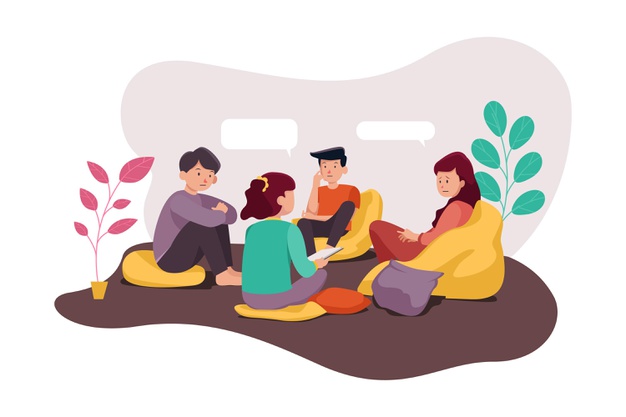
Group therapy is a form of therapy that involves one or more therapists working with several people at the same time.
Have you seen it in the movies? People sitting in a circle and talking about their problems without the fear of judgment?
Yes, that is a close idea about group therapy.
Depending on several factors, group therapy can be a good choice for addressing your problems and making amends in your life. Group therapy can reduce waiting time and give a larger amount of people access to mental healthcare.
BENEFITS OF GROUP THERAPY
- Group therapy provides a social atmosphere similar to real life.
- It is cost-effective hence making it accessible to people with low income.
- It inculcates a sense of relief in the individual by assuring them of the fact that they aren’t alone.
- Participants get to learn from everyone’s individual experiences.
- Group Therapy decreases the feeling of loneliness and isolation. It helps participants learn socialization skills.
- It facilitates giving and receiving support.
- Participants receive feedback and remarks that help bring about change.
“Bibliotherapy is a creative arts therapy that involves storytelling or the reading of specific texts with the purpose of healing.”
Apart from conditions such as depression and panic disorder group therapy can also help people with:
Group Therapy can help with:
-
- Obesity
- Chronic pain
- Anger management
- Cultural trauma
- Chronic illness
5 Types of Group Therapy
-
- Self Help
- Substance Abuse
- Group therapy for grief
- Counselling
- Psychoeducational
Groups can vary according to specific types of problems. The purpose of the group, its principal characteristics, necessary leadership skills and styles, and typical techniques are the broad categories on the basis of which the groups are divided for therapy.
Some of them are:
Self Help Group Therapy
These groups are organized and led by individuals who have learned ways of overcoming or adjusting to their problems. The therapy members benefit from such experience, while also benefiting from the opportunity to talk about their own difficulties, express their feelings and provide support to each other.
Some examples of self-help groups can be self-help groups for alcohol dependence or self-help groups for parents with handicapped children.
Substance Abuse Group Therapy
Group therapy for people with addiction is perhaps the most well-known type of therapy. In these therapy groups, recovering addicts gather to encourage one another and work through recovery programs and channels.
Some attendants are sometimes yet to get clean while others have been sober for years. Some groups include 12-step programs and sponsors to aid in recovery.
Group Therapy for Grief
When a loved one dies, the event can leave people feeling lost and alone. Groups for grieving people can help them find community and strength in these trying times. Sometimes groups focus on specific types of grief.
For example, a session may specifically help parents who lost children or surviving spouses. However, some groups help people who are grieving more generally.
Counseling Group Therapy
These groups focus on interpersonal strategies to help people resolve the usual, yet often difficult, problems of life. The primary task in the group is accomplished by the participants supporting and challenging each other in self-exploration. The group leader acts as a facilitator more than a mentor, leading the group through a series of developmental stages.
Some examples of counseling groups are groups for those coping with divorce or groups for those navigating the transition to retirement.
Psychoeducational Group Therapy
This therapy focuses on developing group members’ thinking, feeling, and behavior through a structured learning format within and across group sessions. People that attend psychoeducational group therapy are often high-functioning but have information lacking in a certain area, such as parenting skills or assertiveness.
The group leader is a bit like a teacher in addition to a facilitator as he or she provides factual information, leads discussions, and helps group members incorporate the information into their lives through skill-building exercises.
In addition to parenting skills groups and assertiveness training, other examples of psychoeducational groups are stress management groups and caregiver training.
IS GROUP THERAPY ENOUGH?
Participating in both group therapy and individual psychotherapy is beneficial for many people. Your chances of achieving significant, long-lasting improvements can be increased by taking part in both forms of psychotherapy. If your progress in individual psychotherapy has slowed down, attending a group may jump-start your personal growth.
SOME ACTIVITIES THAT CAN BE DONE DURING GROUP THERAPY
-
- Friendship Mural
- Treasure Map
- Inner Child
- My Perfect Life
Friendship Mural
Big banner: “A true friend is someone who…” Participants fill the mural with images and words that complete this sentence.
Treasure Map
On a piece of paper, label one corner, “The beginning” and another corner, “Success.” Draw a windy path between the two points. Using collage materials, create stations along the path with creative titles, such as “Crossing the desert of loneliness,” “Forgiveness and letting go,” “Climbing the mountain of determination,” “Resting in the shade of a caring friend,” etc.
Inner Child
Draw yourself as a child on your paper. Add images and words to give this child everything that it needs, including a supportive nurturing parent.
My Perfect Life
Draw an image of your perfect life, including your home, relationships, achievement, and everything you’ve ever dreamt of. Turn your paper over and write three steps that will help you accomplish this.
Suicide prevention
If you think someone is at immediate risk of self-harm or hurting another person:
- Call local emergency number.
- Try the Jeevan Aastha Helpline at 1800 233 3330
(disclaimer: GoodLives is not a suicide prevention helpline)
Check out more such conversations about employee wellness in our series, Hope Infinite.
0 Comments